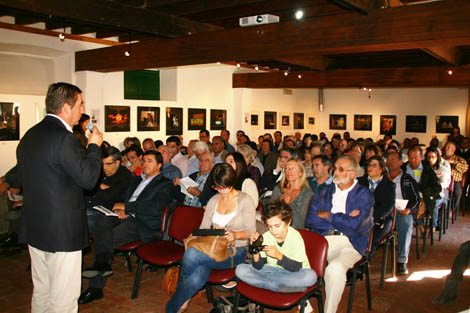 Simple ideas that, more than giving definitive solutions, pointed out ways, conveyed in a concise and clear way and a room completely full of people interested in listening to them. The initiative «Innovate in the Burning Lands» enthused the people of Serra do Caldeirão, who, on Saturday, were present in force at the Museu do Trajo of São Brás de Alportel to debate solutions for the territory that was destroyed by the fire that hit this county and the one in Tavira in July.
Simple ideas that, more than giving definitive solutions, pointed out ways, conveyed in a concise and clear way and a room completely full of people interested in listening to them. The initiative «Innovate in the Burning Lands» enthused the people of Serra do Caldeirão, who, on Saturday, were present in force at the Museu do Trajo of São Brás de Alportel to debate solutions for the territory that was destroyed by the fire that hit this county and the one in Tavira in July.
A session that served to clarify some doubts, with the regional director of Forests António Miranda being the speaker most questioned by the public and even announcing an intention to invest in the forestry sector, more specifically in the planting of carob trees. But, above all, there was the idea that any solution must go through good planning and coordination between those who want to invest in the recovery of burnt territories.
The Regional Director of Forests even assumed that, in all his years of service and in the many initiatives that he has been, "this is the first time that the question has been asked properly". “If forest space is not profitable, no one will manage it. Either we innovate and find solutions so that it becomes profitable or no one will be interested in exploring it,” he said.
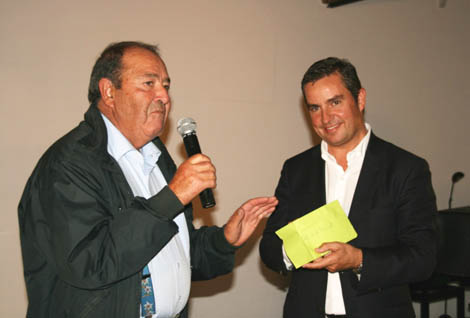
The profitability of the forest space is the basis for fire prevention, added António Miranda. “If the forest is profitable, it is managed, if it is managed, the necessary maintenance is carried out and if the maintenance is carried out, the risk of fire is drastically reduced. It is not worth mentioning whether there are helicopters and planes to fight fires, which cost much more money than is given to forests and their profitability», he considered.
Money was even part of the session, but from a different perspective. A citizen of São Brás took the opportunity to deliver a check for donations to the São Brás solidarity account, collected within the German community that lives in this mountain council. "My wife and I, who is German, celebrated our birthdays and asked our friends to contribute to the solidarity bill instead of giving us a gift," said Manuel Belchior.
Innovating doesn't have to be complicated
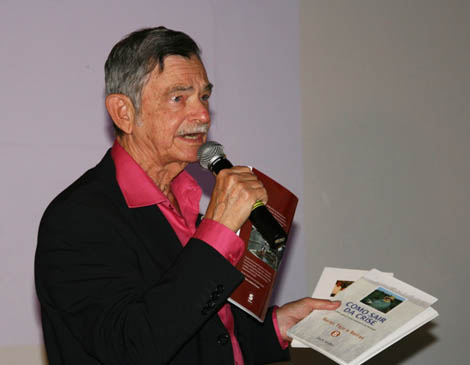 The seminar was based on a model of quick presentations, with time being scrupulously controlled by the co-organizer of the Jack Soifer initiative, who joined the Câmara de São Brás and Tavira in promoting the event.
The seminar was based on a model of quick presentations, with time being scrupulously controlled by the co-organizer of the Jack Soifer initiative, who joined the Câmara de São Brás and Tavira in promoting the event.
The four presentations initially planned, one of which that of António Miranda, was eventually joined by a farm, by an agro-forestry entrepreneur who already has an exploration of 200 hectares of carob trees near Odeleite and who has shown a willingness to invest in a much wider territory. .
Entrepreneur Luís Cabrita guaranteed that he is "willing to invest in the 11 hectares that used to be bushland, planting carob trees", a tree he is said to have "in love" and which, this year alone, has already planted "40 units" . An ambitious idea, but it is not simple to implement, as the entrepreneur himself admitted.
Right from the start, the idea is dependent on the volume of raw material, since it would be a matter of planting millions of trees, an amount that is far from existing in nurseries.
Another problem to be resolved would be the lack of European incentives for this culture. Luís Cabrita defended that, in the review of the Common Agricultural Policy underway, Portugal should insist on including this crop in the group of subsidized ones, since it is an endemic tree, whose fruit, the carob, has a high commercial and industrial potential.
In the other interventions in the afternoon, the focus was given to the concrete experiences of the guests. The highlights were the use of the ashes left behind by fire, the usefulness of the fig tree, aka cigarette holder, as a fire break and the basic techniques of Permaculture for retaining water and using soil.
Ashes, Tourism and Organic Agriculture
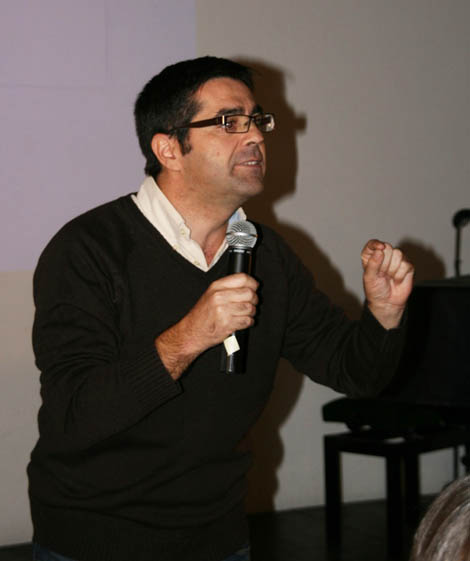 The first speaker of the afternoon came from far away, more specifically from Castelo Branco, to talk about some solutions that were adopted in that district and in its neighbors following a forest fire that also destroyed thousands of hectares of forest. And one of the most pressing problems was the use of ash, not only to take advantage of the nutrients they maintain, but also for pest control. “We used ash to control the butterfly pest on potatoes, instead of chemical products”, exemplified professor Jorge Santos.
The first speaker of the afternoon came from far away, more specifically from Castelo Branco, to talk about some solutions that were adopted in that district and in its neighbors following a forest fire that also destroyed thousands of hectares of forest. And one of the most pressing problems was the use of ash, not only to take advantage of the nutrients they maintain, but also for pest control. “We used ash to control the butterfly pest on potatoes, instead of chemical products”, exemplified professor Jorge Santos.
Industry can also use the ashes that remain after the fire, namely to make concrete, bricks or synthetic floors, for sports use. Jorge Santos also spoke of successful examples of economic recovery after fire, in this case in the area of Tourism. «In Sertã, an estate that was completely burned was recovered for tourism and for viticulture» - Today, it is not only a reference hotel in the region, but also produces organic wine.
The bet on organic farming was another solution presented by the same speaker. “Burnt soils can be treated to introduce organic farming”, a process that is more simplified than adapting any other type of land for this purpose, as the certification of these products is very strict. The idea behind the ongoing projects in Beira Interior «is to try to call young people who are unemployed in big cities».
Permaculture as a remedy against drought
João Cunha is also a Basic Education teacher, but he combines this activity with that of a farmer, following the principles of Permaculture, which defends, among other things, a good organization of the productive space, to improve the quality of the final product and minimize costs. impacts of the farm.
The ideas brought up by the Messines producer focused on "the problem of water and soil". In the first case, this is an issue on the agenda, since the climate trend in the Algarve, according to experts, is the existence of long periods without rain, followed by short periods with a lot of rainfall, as we have seen in the last few years. days.
This reality entails great risks for the soils, which are more subject to erosion and “washing of nutrients” due to the rapid runoff of water in “schist soils and steep slopes”, such as those that predominate in Serra do Caldeirão. Permaculture presents a solution to this problem, which involves the construction of retention ditches, «always following the contour lines».
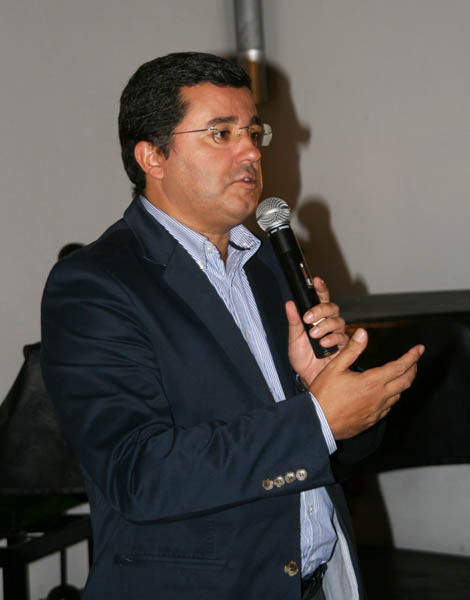 At the bottom, it is a matter of creating small ditches, every 10 meters or more, depending on the slope of the land, which retain the water when the rain is intense and then allow it to slowly infiltrate, for the benefit of the crops that are below you. A technique that the farmer uses and from which he even provided detailed diagrams to those present, which is not difficult to carry out, although it is essential to make the ditch at a constant altitude, so that the water does not escape.
At the bottom, it is a matter of creating small ditches, every 10 meters or more, depending on the slope of the land, which retain the water when the rain is intense and then allow it to slowly infiltrate, for the benefit of the crops that are below you. A technique that the farmer uses and from which he even provided detailed diagrams to those present, which is not difficult to carry out, although it is essential to make the ditch at a constant altitude, so that the water does not escape.
At the soil level, João Cunha recommends that the clearing of the undergrowth of the land, when it comes to agro-forestry farms, should be done «with a brush, so as not to pull out the roots of the herbs that exist there», which allow them to «grab the soil, retain water and maintain nutrients».
The fig tree is not scared of fire
One of the issues that has been raised by several specialists is the need to rethink the forestry organization in Caldeirão, avoiding very extensive patches of a single crop. Something that is avoided with the planting of bags of species more resistant to fire, which allow to slow down the fire's progression or even block it.
One of the most talked about species, also mentioned several times on Saturday, is the strawberry tree, but José Carlos Alves came up with a very different solution, the creation of a fire barrier with fig trees, known as cigar trees.
This plant has characteristics that make it very resistant to fire and able to regenerate even when subjected to high temperatures. At the same time, it can be exploited commercially, as its fruit is highly appreciated, and the palms, the fleshiest part of the plant, can have different uses, including forage for animals.
The plant's effectiveness as a firebreak, guaranteed the businessman, was tested in the field with positive results. In addition to retaining fire, the cigarette holder has the advantage of being a short plant, which allows firefighters to protect themselves behind it and fight the flames from a distance.
And nothing better than a practical example to demonstrate what is said. For an hour, José Carlos Alves kept a palm holder on the fire in a brazier, and despite being burned in the area where the fire was directly affecting, it did not catch fire and even released a liquid that cools the temperature of the flames. "If we eat it after burning, it reminds us of grilled peppers," he added.
Planning and partnerships are key
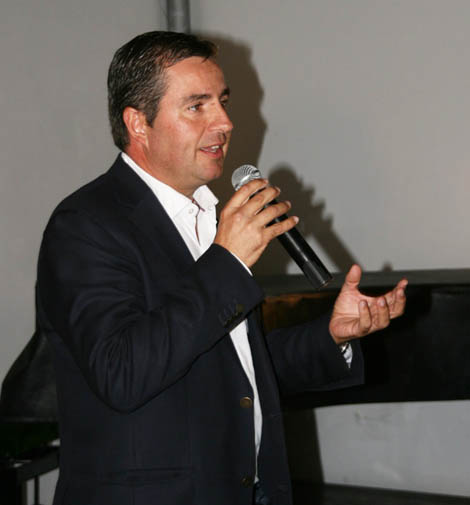 In the end, the conclusions were made by the Algarve parliamentarian Miguel Freitas and the former MEP Jamila Madeira, both from the PS. Earlier, Jack Soifer also left a warning for those who would like to export his product in the future. “The large food industry is a thing of the past. Now, we are returning to the traditional, with innovative techniques», he considered.
In the end, the conclusions were made by the Algarve parliamentarian Miguel Freitas and the former MEP Jamila Madeira, both from the PS. Earlier, Jack Soifer also left a warning for those who would like to export his product in the future. “The large food industry is a thing of the past. Now, we are returning to the traditional, with innovative techniques», he considered.
Those who bet on less intensive agriculture open up much more interesting markets, where they can sell their products with added value. «To export these products, the problem is not the quantity of production, but the volume of cargo. We can have the best product and not be profitable to export. That's where we have to unite, through the concept of integrated cargo», he considered.
Jamila Madeira also focused on unity, through the organization of producers into associations, something she considers fundamental for future success. Miguel Freitas, on the other hand, stressed the need for all this to follow a plan, without prejudice to each producer deciding the destination to give to their land.


















Comments